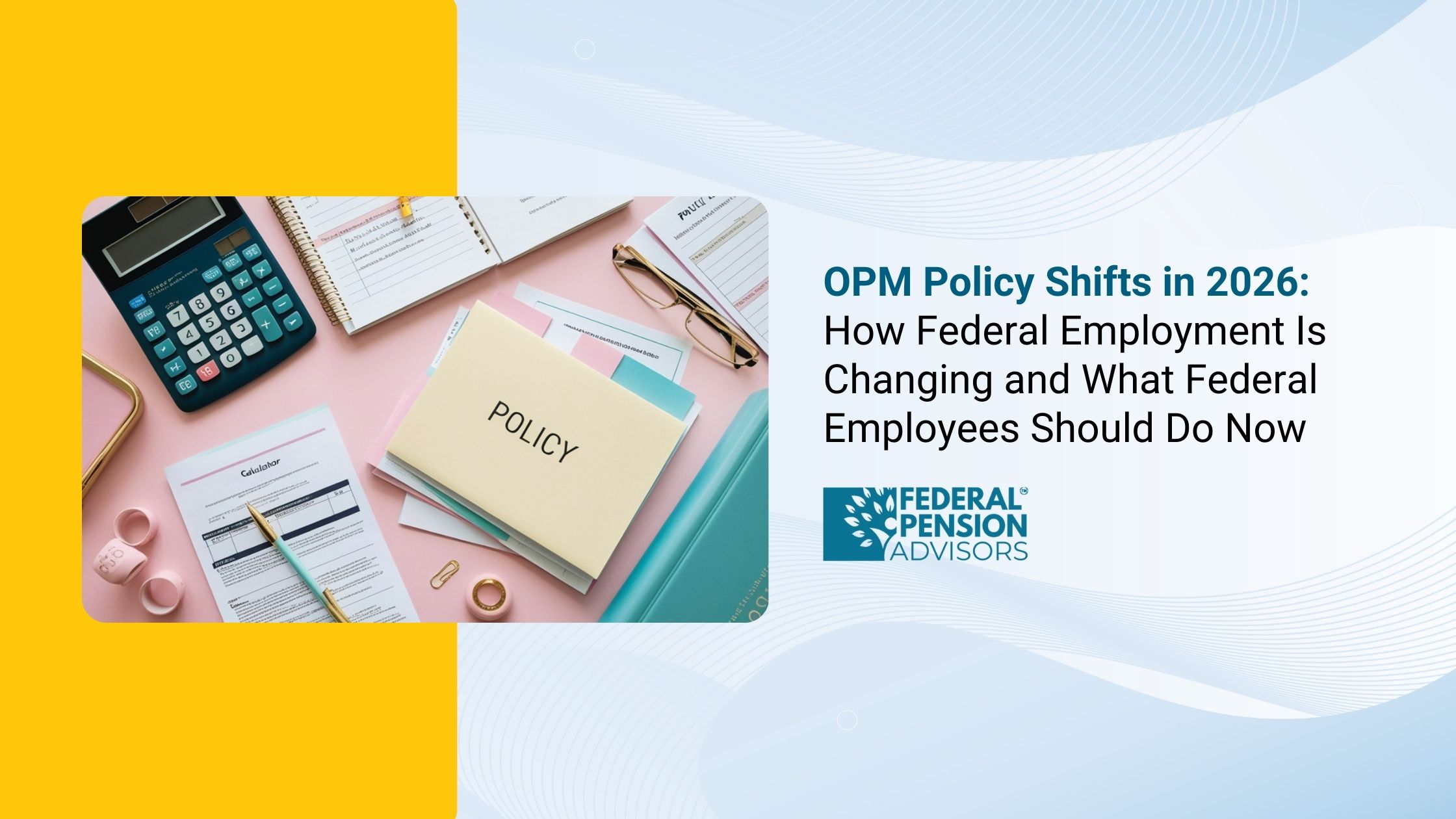You’re not alone; 4,359 federal employees booked their free review.

What Is FERS Annuity Supplement? And Earnings Limit 2024
The FERS Annuity Supplement is a temporary benefit designed for federal employees who retire before the age of 62. Its primary purpose is to provide additional income during the period between early retirement and the start of Social Security payments.
Federal employees covered under the Federal Employees Retirement System (FERS) who retire before age 62 under immediate retirement provisions (excluding “MRA+10” or “MRA+20” reduced retirement options) are eligible to receive both a monthly FERS pension and the Special Retirement Supplement (SRS).
These payments generally begin one to two months after retirement. The FERS pension is a lifetime benefit, ensuring consistent income throughout the retiree’s life. Annual cost-of-living adjustments (COLAs) apply to the FERS pension starting the year after the retiree reaches age 62, increasing the gross annuity amount. In contrast, the SRS payments stop at age 62 and do not include COLAs.
What Is FERS Annuity Supplement For Federal Employees?
The FERS annuity supplement, also known as the special retirement supplement, is a retirement benefit for eligible federal government employees who retire before they turn 62. The supplement represents the income an employee would be earning from Social Security if they were old enough to start claiming it.
Although it is based on Social Security calculations, the FERS Supplement is not a Social Security benefit. Instead, it forms part of the FERS Pension Plan and is managed by the Office of Personnel Management (OPM). Federal employees need to understand how the supplement works, including its eligibility requirements, main features, and potential tax implications, to make the most of their retirement income.
The FERS supplement is commonly available to certain professions that allow for early retirement, such as law enforcement officers, firefighters, and air traffic controllers, all of whom benefit from special provisions under federal retirement rules.
Eligibility Requirements For FERS Supplement
To qualify for the fers supplemental annuity, specific conditions must be met, reflecting the requirement for a substantial commitment to federal service. Meeting these eligibility criteria is crucial for securing the supplement.
A person must retire under one of the following scenarios:
- They retire with an immediate annuity from FERS that is not reduced for age.
- They retire before reaching the minimum retirement age (MRA) due to a reduction in force, major reorganisation, or an early retirement programme.
If a retiree does not fall under the first scenario—retiring with an immediate annuity that isn’t reduced for age—they won’t begin receiving the special retirement supplement until they reach their MRA, which ranges from 55 to 57, depending on their birth year.
To be eligible for the FERS Special Retirement Supplement, federal employees must meet one of the following conditions:
- Immediate Retirement: Either at the MRA with at least 30 years of service, or at age 60 with at least 20 years of service.
- MRA+10: This option is not eligible for the supplement.
- Special Provision Employees: Those such as law enforcement officers, firefighters, or air traffic controllers can qualify at any age with 25 years of service, or at age 50 with at least 20 years of service.
- Early Retirement (VERA or VSIP): Eligibility for the supplement begins once you reach the MRA, following an early retirement under Voluntary Early Retirement Authority (VERA) or Voluntary Separation Incentive Payment (VSIP).
How To Calculate The FERS Annuity Supplement?
Calculating a FERS Annuity Supplement involves several factors, including your:
- Years of Service: The longer you've served, the higher your supplement will generally be.
- High-3 Salary: This is the average of your highest three years of salary.
- Social Security Benefit: The amount you're expected to receive from Social Security at age 62.
The OPM uses a specific formula to calculate the supplement. This formula takes into account the difference between your expected Social Security benefit at age 62 and a certain percentage of your High-3 salary. If you also want to check your paycheck then visit the Paycheck calculator.
We are the Federal Pension Advisors, we specialize in connecting federal employees and retirees with experienced financial advisors who help you choose a rewarding pension plan and step ahead with financial freedom. We offer Retirement Planning, Wealth management, Investment advice, 403 (b) plan etc.
We serve every federal employee. Our customized approach helps you subscribe to plans, and live a secure and prosperous retirement!
Connect with us today and get FREE CONSULTATION now!

FERS Supplement Earnings Limit 2024
For 2024, the Federal Employees Retirement System (FERS) fers supplemental annuity has an earnings limit set at $21,560. If a retiree earns more than this amount in a given year, their FERS supplement may be reduced or even eliminated. This earnings limit applies to income from wages or self-employment, and exceeding it can significantly impact the amount of supplement received.
The FERS supplement earnings limit in 2024
- Below FRA ($1 for $2) above $22,320
- Reaching FRA ($1 for $3) above $59,520
Does Early Retirement Affect Your FERS Supplement?
Early retirement can influence your FERS Annuity Supplement in several important ways:
- Reduced Benefit: Retiring before your normal retirement age (typically 62) means your FERS annuity may be reduced, which will also lower the amount of your supplement.
- Earnings Limit: The earnings limit becomes more significant if you retire early. You may need to limit your income to avoid reductions or elimination of your supplement. In 2024, the limit is $21,560.
- Duration: If you retire early, the supplement may be paid for a shorter period since you will reach age 62—when Social Security benefits become available—sooner.
Planning for these factors can help you maximise your retirement benefits.
Exception to the Earnings Test Limit for Special Provision Employees
Law Enforcement Officers (LEOs), firefighters, and air traffic controllers benefit from an exemption to the earnings limit up until they reach their minimum retirement age (MRA). This exemption allows them to earn income well above the $22,320 earnings test limit without any reduction in their FERS supplement as soon as they start receiving it.
However, once they reach their MRA (between 55 and 57, depending on their birth year), the earnings test limit will apply from that point until they reach age 62. At that stage, income over the limit could reduce or eliminate the supplement.
When a FERS employee with at least 20 years of service retires at age 62 or older, they become eligible for a special 10% bonus on their FERS retirement pension.
Increased Pension Multiplier: Under the standard FERS formula, the pension multiplier is 1%. However, employees who retire at age 62 or older with at least 20 years of service benefit from an increased multiplier of 1.1%. This effectively raises their pension by 10%.
Eligibility Requirements:
To qualify for this enhanced pension, employees must meet the following conditions:
- Be at least 62 years old at the time of retirement
- Have a minimum of 20 years of creditable service
- Retire under the immediate FERS Retirement option (not a deferred or postponed retirement)
Example:
An employee with 20 years of service and a High-3 salary of $100,000 would typically receive an annual pension of $20,000 ($100,000 x 1% x 20 years).
With the higher multiplier, their pension increases by 10% to $22,000 per year ($100,000 x 1.1% x 20 years).
FAQ’s
1. Can you receive the FERS supplement if you retire before age 62?
You can still receive the FERS Annuity Supplement if you retire before age 62, but it may be reduced. The reduction depends on various factors, such as your age at retirement and the specific type of early retirement you select. Understanding these factors is important in calculating the exact amount of your supplement.
2. Is FERS Annuity Supplement Taxable?
Yes, the FERS Annuity Supplement is generally taxable. It is considered part of your taxable income and is subject to federal income tax, as well as state and local taxes where applicable.
3. How Can You Estimate Your FERS Annuity Supplement?
- Use the OPM’s Online Retirement Calculator: The Office of Personnel Management (OPM) offers an online tool that allows you to estimate your potential retirement benefits, including the FERS supplement. To get accurate results, you’ll need to input details such as your years of service, salary history, and projected Social Security benefits.
- Consult with a Retirement Counselor: The OPM also provides retirement counselling services where a professional can give you personalised estimates and guidance tailored to your specific situation. This can help you better understand your options and maximise your retirement benefits.
4. Is There a Penalty for Retiring Before Age 62?
Yes, retiring before age 62 can affect your FERS supplement. If your post-retirement earnings exceed the annual limit set by the Social Security Administration, your supplement may be reduced or even discontinued.
Additionally, there may be a temporary income gap when transitioning from the FERS annuity supplement to Social Security benefits. Planning your retirement timeline and managing your earnings carefully is crucial to minimise penalties and maximise your benefits.


Get Updated
Subscribe to our weekly updates for the latest on retirement planning, federal benefits, exclusive webinars, and more!
Download Federal Retirement: Step-by-step Checklist
This comprehensive guide will help you understand your federal benefits, optimize your savings, and plan for a comfortable future.



.png)








